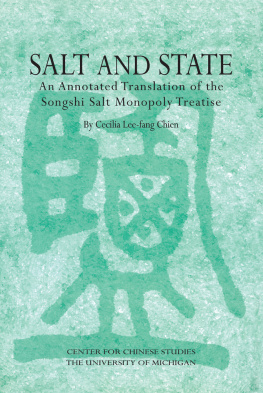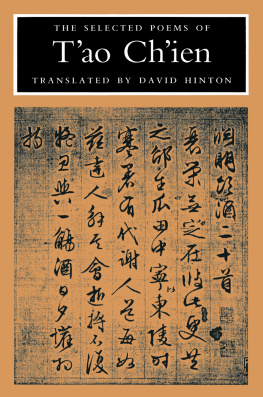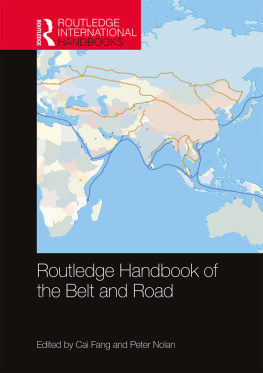Cecilia Lee-fang Chien - Salt and State
Here you can read online Cecilia Lee-fang Chien - Salt and State full text of the book (entire story) in english for free. Download pdf and epub, get meaning, cover and reviews about this ebook. year: 2020, publisher: Kenneth G. Lieberthal and Richard H. Rogel Center for Chinese Studies, genre: Politics. Description of the work, (preface) as well as reviews are available. Best literature library LitArk.com created for fans of good reading and offers a wide selection of genres:
Romance novel
Science fiction
Adventure
Detective
Science
History
Home and family
Prose
Art
Politics
Computer
Non-fiction
Religion
Business
Children
Humor
Choose a favorite category and find really read worthwhile books. Enjoy immersion in the world of imagination, feel the emotions of the characters or learn something new for yourself, make an fascinating discovery.
- Book:Salt and State
- Author:
- Publisher:Kenneth G. Lieberthal and Richard H. Rogel Center for Chinese Studies
- Genre:
- Year:2020
- Rating:3 / 5
- Favourites:Add to favourites
- Your mark:
- 60
- 1
- 2
- 3
- 4
- 5
Salt and State: summary, description and annotation
We offer to read an annotation, description, summary or preface (depends on what the author of the book "Salt and State" wrote himself). If you haven't found the necessary information about the book — write in the comments, we will try to find it.
Salt and State — read online for free the complete book (whole text) full work
Below is the text of the book, divided by pages. System saving the place of the last page read, allows you to conveniently read the book "Salt and State" online for free, without having to search again every time where you left off. Put a bookmark, and you can go to the page where you finished reading at any time.
Font size:
Interval:
Bookmark:

SALT AND STATE
AN ANNOTATED TRANSLATION OF THE SONGSHI SALT MONOPOLY TREATISE
Cecilia Lee-fang Chien
Center for Chinese Studies
The University of Michigan
Ann Arbor
Open access edition funded by the National Endowment for the Humanities/Andrew W. Mellon Foundation Humanities Open Book Program.
MICHIGAN MONOGRAPHS IN CHINESE STUDIES
ISSN 1081-9053
SERIES ESTABLISHED 1968
VOLUME 99
Published by
Center for Chinese Studies
The University of Michigan
Ann Arbor, Michigan 48104-1608
2004 The Regents of the University of Michigan
Library of Congress Cataloging-in-Publication Data
Chien, Cecilia Lee-fang
Salt and state : an annotated translation of the Songshi salt monopoly treatise / Cecilia Lee-fang Chien.
p. cm. - (Michigan monographs in Chinese studies, ISSN 1081-9053 ; v. 99)
Includes bibliographic references and index.
ISBN 0-89264-163-0 (alk. paper)
1. Salt industry and tradeChinaHistory. 2. Song shi. Shi huo zhi. Yan. 3. Government monopoliesChina. 4. ChinaHistorySong dynasty, 960-1279. I. Song shi. Shi huo zhi. Yan. English. II. Title. III. Michigan monographs in Chinese studies no. 99.
HD9213.C42C517 2004
338.476644095109021dc22
2003055689
ISBN 978-0-89264-163-5 (hardcover)
ISBN 978-0-472-03806-0 (paper)
ISBN 978-0-472-12750-4 (ebook)
ISBN 978-0-472-90145-6 (open access)
The text of this book is licensed under a Creative Commons Attribution-NonCommercial-NoDerivatives 4.0 International License: https://creativecommons.org/licenses/by-nc-nd/4.0/
To my mother, Florence Chien, and to the memory of my father,
Gabriel Y. T Chien, 19222002
CONTENTS
MAPS
TABLES
The rich and unprecedented developments in virtually every aspect of Chinese culture dunng the Song dynasty (960-1279) have inspired scholars to delve into its many and diverse areas. In recent years in China, Japan, and the West the study of the state salt monopoly in the larger context of Chinas bureaucracy and political economy has generated rising interest. My annotated translation and Introduction to the complete text of the salt monopoly treatise in the Songshi, the Song dynastic history, may be seen as part of this effort.
Through much of the imperial period, the monopoly stood second only to the land tax in generating revenues, particularly during the Song, when it provided over 50 percent of the states cash income. Although the Song was arguably Chinas greatest age, its imperial administration felt fiscal pressures from the start. The governments central dilemma was how to maximize state revenues while improving its peoples welfare. In response to ongoing military pressures, Song emperors assumed near complete control over the fisc in general and the lucrative salt monopoly in particular, their efforts arguably achieving the apex of court activism in the imperial era. They prohibited private individuals from trespassing on the states monopoly revenues and established penalties for those who broke the law; they increased their personal control over financial decision-making by creating offices directly answerable to the throne; they presided over meetings on fiscal affairs and frequently inquired into the states financial condition; and they had accounting records compiled to keep them informed of the overall fiscal process.
The state controlled the military, political, and economic resources necessary to maximize income, but even so it faced constraints. Each actor in the multi-layered and many-faceted salt trade, from the emperor, local officials, monopoly administrators, producers, and merchants, on down to consumers, had his own interests, interests often at odds with those of other actors. The state itself did not necessarily speak with one voice. The salt monopoly, which was key to the stability and prosperity of the dynasty, provides an excellent window onto the relationship between the government and the economy in the Song. The problems of the Songs bureaucratically managed economy are not unique, but rather resonate with problems generated by command economies elsewhere, both historical and in our own day.
The Songshi treatise, unlike any other source contemporary to the period, organizes the subject of the salt monopoly into an intelligible narrative that is unsurpassed in detail. As far as I know, no special study has been devoted to this work, nor does a complete English translation exist. Written in the language of memorials and policy pronouncements of a millennium ago, a language characterized by filler and convention, the salt treatise is replete with technical terms that relate to fmance, politics, and the industry itself. The complexities of bureaucracy, political process, and factional debates are especially confounding for the latter-day reader. Song rulers perpetuated many institutions of the Tang and Five Dynasties, and they also introduced new institutions, creating the most complex administrative nomenclature in imperial Chinese history. I have tried to sort out these issues, inserting clarifying interpolations into the text and adding commentary where it seemed necessary.
I have used the punctuated Zhonghua Press edition of the Songshi for my translation, which averages about four parts annotation for every one part translation. I have corroborated, corrected, and supplemented lacunae of topic and time by referring to other major historical records. The running commentary offers my brief explication of how the Songshi editors presented policies and activities related to the salt monopoly. To paraphrase Denis Twitchett (1992), the writing of history was for historians not only a political act, but also an evaluative and interpretive one. I believe the Songshi editors, like Song officials, believed in maintaining a stable market and ensuring revenues, but these historians viewed the extreme controls of some officials (the Wang Anshi camp, especially) quite critically, and this is reflected in their treatment. But while the historians and bureaucrats may have differed on the means of generating state revenue, they did not greatly disagree on ends.
It is my hope that the introduction will enable readers to better understand the annotated translation by giving an overview of the dynamics of the monopoly against a backdrop of governmental centralization and foreign relations. This book will be useful to those interested in Chinese institutional history, economic history, fiscal administration, law, and historiography, as well as comparative bureaucracy and monopoly. Although some problems have necessarily been left unresolved, I trust that this endeavor will ease the task of future students in the field.
* * * *
The passage to completion of this book has been an odyssey for me in time, space, motion, and emotion. I thank Peter K. Bol of Harvard University for the inception of this work as a doctoral dissertation. I deeply appreciate his unfailingly open door, his candid reading of my drafts, and his confidence throughout the long haul, which helped me bring this work to fruition. His devotion to the field and to the facts continues to be an inspiration. I am further grateful to my graduate advisors Tu Wei-ming, who tried to keep me from losing sight of the forest, and Philip Kuhn, whose methodological questions and affection for documents are compelling.
Paul Smith of Haverford College went over the early draft with a fine-toothed comb; his queries could launch another tome. Peter Golas of the University of Denver gave essential advice at a late stage. I am indebted to a number of scholars for their generosity in sharing their manuscripts and visions: Bao Weimin and Liang Taiji of Zhejiang University; Lin Yimin of the Hong Kong University of Science and Technology; Liu Jiahe of Beijing Normal University; Seo Tatsuhiko of Chuo University; Hans Ulrich Vogel of the University of Teubingen; and Yang Weisheng of then Hangzhou University. I also express my thanks for the travel and research grants from the International Rotary Foundation, the History Department of Harvard University, and the School of Humanities and Social Sciences at the Hong Kong University of Science and Technology.
Font size:
Interval:
Bookmark:
Similar books «Salt and State»
Look at similar books to Salt and State. We have selected literature similar in name and meaning in the hope of providing readers with more options to find new, interesting, not yet read works.
Discussion, reviews of the book Salt and State and just readers' own opinions. Leave your comments, write what you think about the work, its meaning or the main characters. Specify what exactly you liked and what you didn't like, and why you think so.













